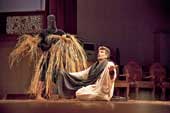 |
| A scene from King Lear; (below) M.K. Raina |
He was one of the few theatre persons who spoke out in favour of Shah Rukh Khan against the Shiv Sena diktat. That came naturally to one who has been braving curfews, zipping bullets and “bullies” in Kashmir, Pakistan, Ladakh, Mumbai, Delhi or Ayodhya. During a brief visit in Calcutta actor/director M.K. Raina spoke to Metro
A word on the Shah Rukh Khan issue. As an actor of parallel cinema, in films such as New Delhi Times and Tamas, and a director of plays like Kabira Khada Bazar Mein and Andha Yug, what is the role of the creative person in these times?
Shah Rukh was the only one in the film industry who had the guts to stand up against these bullies. I think the Shiv Sena should travel more to appreciate India’s diversity. Homogeneity is part of our tradition. What about the classical arts — we have had Muslim ustads teaching Hindu disciples and vice versa.
At the ground level, boundaries don’t exist and religious discriminations don’t stand in the way. But that is not what the professors of intolerant politics want people to know. We live, as it were, in a minefield and decisions that artistes take is crucial. Avoiding the lure of medals (which is strangely hard to resist for some established artistes), one has to keep listening to the inner voice to know right from wrong.
But it is not enough for one or two artistes to protest. It is essential for artists to link with the people and discover the tremendous power of humanity and compassion. They must use Art’s power as a cementing force to counter intolerance.
The year after Babri Masjid, Sahmat (of which I am a founder-member) organised a series of concerts in Mumbai, Surat and Ayodhya. The government didn’t want us to go and the BJP, which was beginning to see Ayodhya as their Vatican, forbade us to come. But what could they do before a siege of some 3,000 artists? There were various kinds of performances with each performer getting to speak for two minutes about why they were there. The BJP went to court against us but we had a whole battery of lawyers who had volunteered to defend us. When M.F. Husain was threatened for his depiction of Saraswati, Sahmat organised seminars and processions carrying the iconography of the Goddess from the earliest times.
 |
| M.K. Raina |
You have done a lot of theatre in Kashmir, where several kinds of performances, including that of the folk artists — Bhands — had been banned as un-Islamic. One production by the Bhands, a version of King Lear, is likely to come to Calcutta in November...
Terrorism robbed Kashmir of all cultural space since the 1990s. There were children who had seen the worst forms of violence and forgotten to speak. Urdu, not Kashmiri, was the approved language. Traditional performers like the Bhands, who once performed at Muslim and Hindu weddings, at dargahs and had links with Sufism, had all of a sudden nothing to do. They were forced to forget their legacy of music and take up menial jobs.
With support from the India Foundation for the Arts, I began workshops for children to help them overcome fear. But with them, as with the adults, planned scripts didn’t work. They preferred to reproduce the plays in their own way. So while none of Shakespeare’s original dialogues survived and the daughters had to be changed to sons (because women are not allowed to act), it was still Shakespeare and an amazing experience.
I deliberately preserved the raw folk appeal. The music was live by traditional musicians in their 70s and 80s. With no electricity, there was no question of lighting, just the costumes were brought from Delhi, which inspired them a lot since they had lost everything.
Last June, when we performed at Akigaan village, a bandh had been declared and there was a compulsory namaaz, so many felt no one would come. But the entire village was so involved in the production that everyone, including the maulvi, rushed through namaaz to be on time for the play. We later played in Srinagar and Guwahati.
What are your upcoming productions about?
There are some texts I may build plays from. One will be an interconnected tale of mothers from conflict zones in Afghanistan, Kashmir, Iraq and the US, where mother is a metaphor for Mother Earth. Another play may grow out of Brahma Rakshasa, the demon stuck between heaven and earth, who knows so much but can’t find anyone to give all that wisdom to.
A third may come from a book I got from the kabadiwala many years back: Autobiography of An Untouchable. It is about an untouchable who hides all his life, changing his faith to survive.
What is your opinion on the current situation in Bengal?
The situation in Bengal is still very flexible and it is important for artistes here to remain neutral and criticise whoever is in the wrong, regardless of which party they are from. Violence is not an alternative. In Kashmir, all artistic expression came to a halt because of violence. I don’t want that to happen in Bengal.











